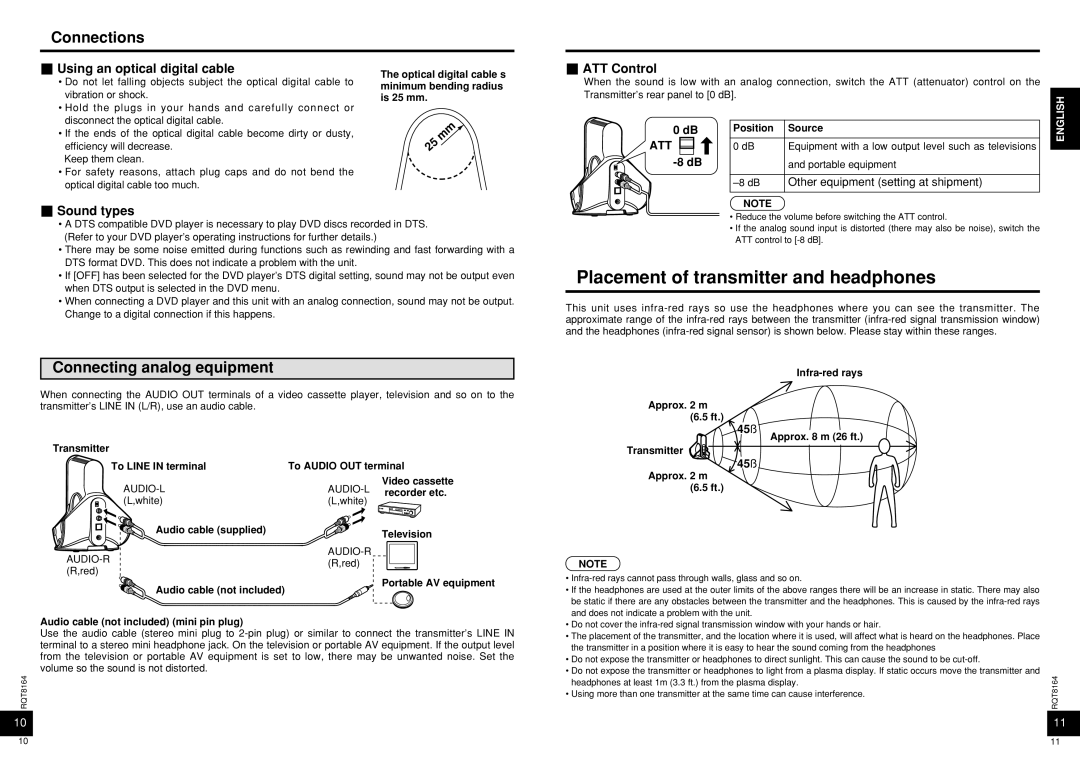
Connections
 Using an optical digital cable
Using an optical digital cable
•Do not let falling objects subject the optical digital cable to vibration or shock.
•Hold the plugs in your hands and carefully connect or disconnect the optical digital cable.
•If the ends of the optical digital cable become dirty or dusty, efficiency will decrease.
Keep them clean.
•For safety reasons, attach plug caps and do not bend the optical digital cable too much.
The optical digital cable’s minimum bending radius is 25 mm.
 ATT Control
ATT Control
When the sound is low with an analog connection, switch the ATT (attenuator) control on the
Transmitter’s rear panel to [0 dB]. |
| ENGLISH | ||
0 dB | Position | Source | ||
| ||||
ATT | 0 dB | Equipment with a low output level such as televisions |
| |
| and portable equipment |
| ||
| Other equipment (setting at shipment) |
| ||
 Sound types
Sound types
•A DTS compatible DVD player is necessary to play DVD discs recorded in DTS. (Refer to your DVD player’s operating instructions for further details.)
•There may be some noise emitted during functions such as rewinding and fast forwarding with a DTS format DVD. This does not indicate a problem with the unit.
•If [OFF] has been selected for the DVD player’s DTS digital setting, sound may not be output even when DTS output is selected in the DVD menu.
•When connecting a DVD player and this unit with an analog connection, sound may not be output. Change to a digital connection if this happens.
NOTE
•Reduce the volume before switching the ATT control.
•If the analog sound input is distorted (there may also be noise), switch the ATT control to
Placement of transmitter and headphones
This unit uses
Connecting analog equipment
When connecting the AUDIO OUT terminals of a video cassette player, television and so on to the transmitter’s LINE IN (L/R), use an audio cable.
Transmitter
To LINE IN terminal | To AUDIO OUT terminal | ||
Video cassette | |||
recorder etc. | |||
(L,white) | (L,white) | ||
| |||
Audio cable (supplied) | Television |
|
Approx. 2 m (6.5 ft.)
45˚
Transmitter
45˚
Approx. 2 m (6.5 ft.)
NOTE
Approx. 8 m (26 ft.)
Audio cable (not included)
Audio cable (not included) (mini pin plug)
Portable AV equipment
•
• If the headphones are used at the outer limits of the above ranges there will be an increase in static. There may also be static if there are any obstacles between the transmitter and the headphones. This is caused by the
• Do not cover the
Use the audio cable (stereo mini plug to
• The placement of the transmitter, and the location where it is used, will affect what is heard on the headphones. Place the transmitter in a position where it is easy to hear the sound coming from the headphones
• Do not expose the transmitter or headphones to direct sunlight. This can cause the sound to be
• Do not expose the transmitter or headphones to light from a plasma display. If static occurs move the transmitter and headphones at least 1m (3.3 ft.) from the plasma display.
RQT8164
10
• Using more than one transmitter at the same time can cause interference.
RQT8164
11
10 | 11 |
